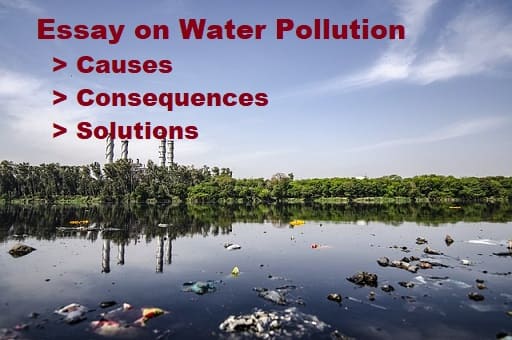Water pollution, a pressing environmental issue, occurs when harmful substances contaminate water bodies, degrading water quality and endangering ecosystems and human health. Industrial waste, agricultural runoff, and improper disposal of chemicals contribute to this problem. Addressing water pollution requires concerted efforts in wastewater treatment, responsible agricultural practices, and public awareness to preserve this vital resource.

Essay on Water Pollution
Water is a precious resource that makes possible life on Earth. However, the alarming increase in water pollution poses a significant threat to both our ecosystems and human health. Water pollution occurs when harmful substances enter bodies of water, such as rivers, lakes, and oceans, contaminating the natural balance and affecting the organisms that depend on these water sources. Lets explore the causes, consequences, and possible solutions to the critical issue of water pollution.
Causes of Water Pollution
Water pollution stems from various sources, both natural and human-induced. Natural causes include volcanic eruptions, algal blooms, and erosion, while human activities are the primary contributors to the degradation of water quality. Industrial discharges, improper waste disposal, agricultural runoff, and sewage discharge are some of the major human-related causes of water pollution. These activities introduce toxic substances, chemicals, fertilizers, and pathogens into water bodies, disrupting the delicate aquatic ecosystems.
Consequences of Water Pollution
The consequences of water pollution are far-reaching and impact both the environment and human well-being. Aquatic ecosystems bear the brunt of pollution, leading to the decline of fish populations, destruction of habitats, and disruption of the food chain. Polluted water sources also pose a threat to human health, as they become breeding grounds for disease-causing bacteria and viruses. Contaminated water can cause waterborne illnesses, such as cholera, dysentery, and hepatitis, which can be fatal, particularly in developing countries with limited access to clean drinking water.
Furthermore, water pollution has detrimental effects on agriculture and economic activities dependent on water resources. Contaminated water used for irrigation can lead to reduced crop yields, affecting food production and livelihoods. Additionally, polluted water bodies lose their aesthetic value, impacting tourism and recreational activities.
Solutions to Water Pollution
Addressing water pollution requires a collective effort from governments, industries, communities, and individuals. Implementing stricter regulations and enforcement of environmental laws is crucial to control industrial discharges and wastewater management. Investing in advanced treatment technologies can help remove pollutants from industrial and municipal wastewater before it is released into water bodies.
Promoting sustainable agricultural practices, such as precision farming and reducing the use of chemical fertilizers and pesticides, can minimize agricultural runoff. Proper waste management systems, including recycling and safe disposal of hazardous substances, are essential to prevent contamination of water sources.
Individuals can contribute by adopting environmentally conscious habits, such as reducing water usage, properly disposing of waste, and avoiding the use of single-use plastics. Supporting organizations and initiatives focused on water conservation and protection can also make a significant impact.
Conclusion
Water pollution poses a grave threat to our ecosystems and human health. The urgency to address this issue cannot be overstated. By understanding the causes, consequences, and solutions to water pollution, we can work together to protect and preserve our precious water resources. It is our collective responsibility to safeguard our water sources, ensuring a sustainable future for generations to come.
